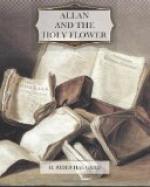The roar of the flames grew less and the tumult within their fiery circle died away. For now the Mazitu were returning from the last fight in the market-place, if fight it could be called, bearing in their arms great bundles of the guns which they had collected from the dead Arabs, most of whom had thrown down their weapons in a last wild effort to escape. But between the spears of the infuriated savages on the one hand and the devouring fire on the other what escape was there for them? The blood-stained wretches who remained in the camps and towns of the slave-traders, along the eastern coast of Africa, or in the Isle of Madagascar, alone could tell how many were lost, since of those who went out from them to make war upon the Mazitu and their white friends, none returned again with the long lines of expected captives. They had gone to their own place, of which sometimes that flaming African city has seemed to me a symbol. They were wicked men indeed, devils stalking the earth in human form, without pity, without shame. Yet I could not help feeling sorry for them at the last, for truly their end was awful.
They brought the prisoners up to us, and among them, his white robe half-burnt off him, I recognised the hideous pock-marked Hassan-ben-Mohammed.
“I received your letter, written a while ago, in which you promised to make us die by fire, and, this morning, I received your message, Hassan,” I said, “brought by the wounded lad who escaped from you when you murdered his companions, and to both I sent you an answer. If none reached you, look around, for there is one written large in a tongue that all can read.”
The monster, for he was no less, flung himself upon the ground, praying for mercy. Indeed, seeing Mrs. Eversley, he crawled to her and catching hold of her white robe, begged her to intercede for him.
“You made a slave of me after I had nursed you in the spotted sickness,” she answered, “and tried to kill my husband for no fault. Through you, Hassan, I have spent all the best years of my life among savages, alone and in despair. Still, for my part, I forgive you, but oh! may I never see your face again.”
Then she wrenched herself free from his grasp and went away with her daughter.
“I, too, forgive you, although you murdered my people and for twenty years made my time a torment,” said Brother John, who was one of the truest Christians I have ever known. “May God forgive you also”; and he followed his wife and daughter.
Then the old king, Bausi, who had come through that battle with a slight wound, spoke, saying:
“I am glad, Red Thief, that these white people have granted you what you asked—namely, their forgiveness—since the deed is greatly to their honour and causes me and my people to think them even nobler than we did before. But, O murderer of men and woman and trafficker in children, I am judge here, not the white people. Look on your work!” and he pointed first to the lines of Zulu and Mazitu dead, and then to his burning town. “Look and remember the fate you promised to us who have never harmed you. Look! Look! Look! O Hyena of a man!”




